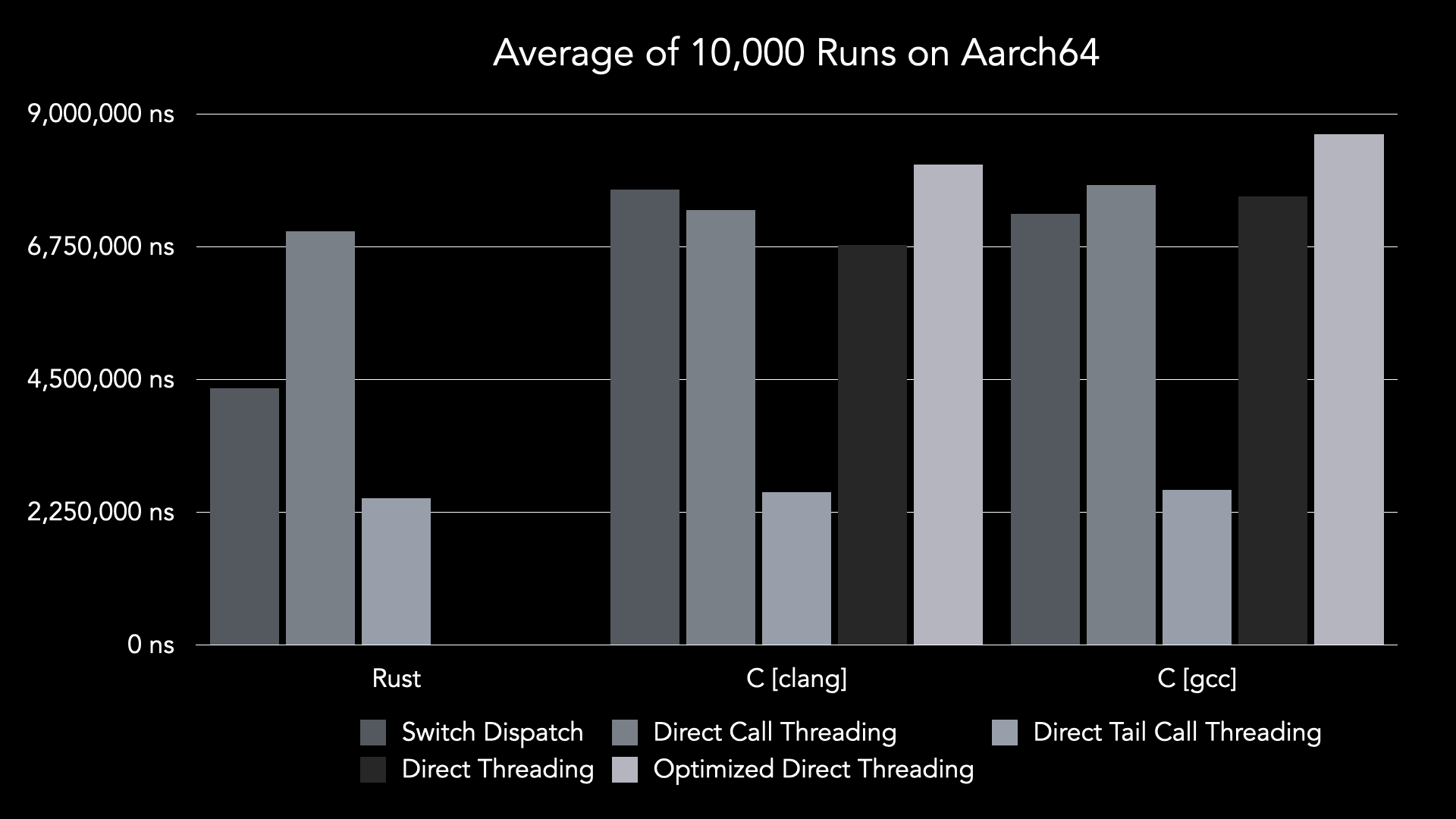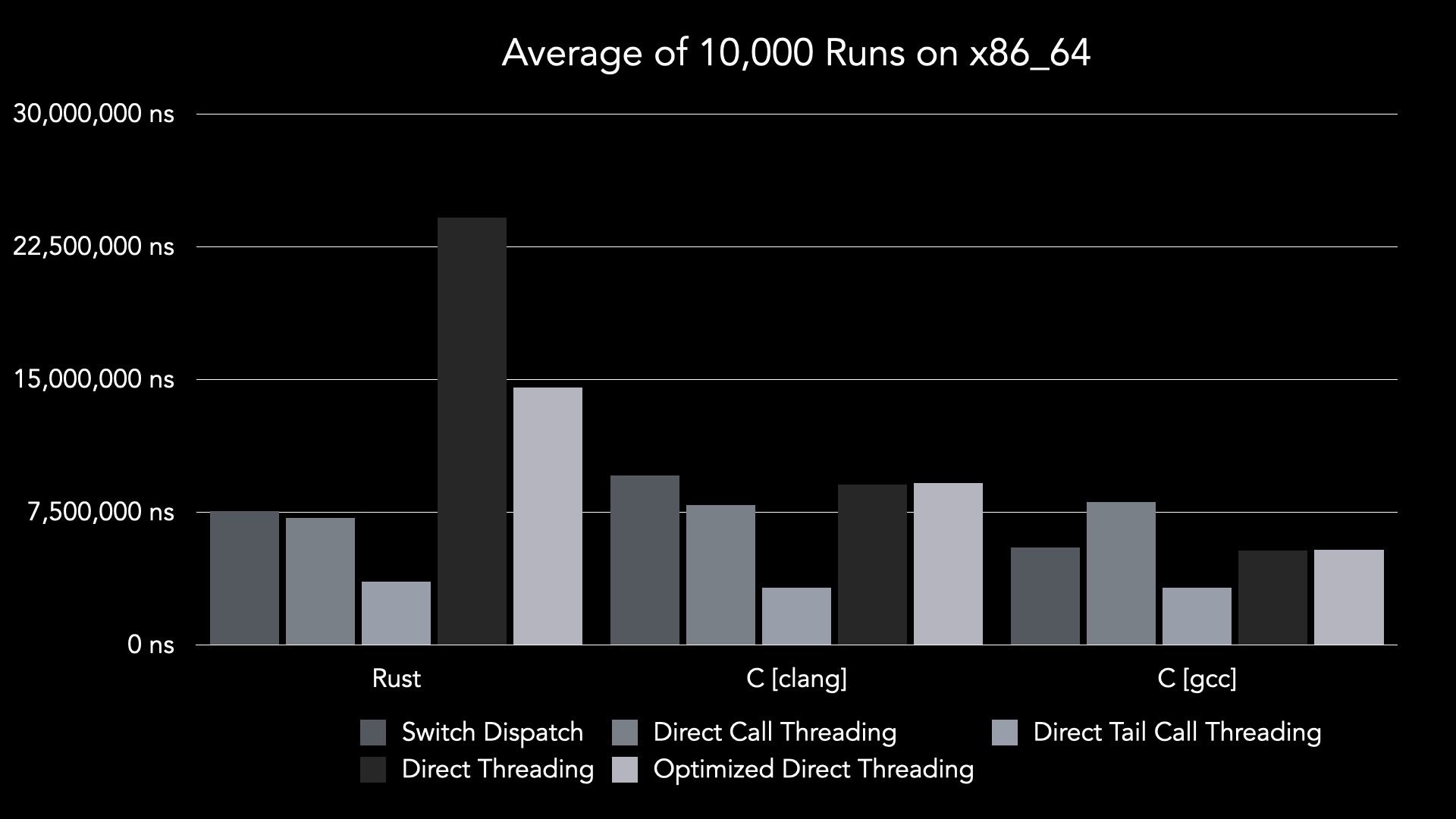This is a project to learn how to implement instruction dispatch in Rust. Instruction dispatch is a technique for executing bytecode instructions in a language interpreter. This project compares five types of instruction dispatch:
- Switch Dispatch
- Direct Call Threading
- Direct Tail Call Threading
- Direct Threading
- Optimized Direct Threading
"Writing Interpreters in Rust: a Guide1" says this about "Instruction dispatch" in "4.8 Virtual Machine: Architecture and Design"
Prior research2 into implementing dispatch in Rust concludes that simple switch-style dispatch is the only cross-platform construct we can reasonably make use of. Other mechanisms come with undesirable complexity or are platform dependent.
In my environment (MacBook Pro 13" 2020 Apple M1), Direct Tail Call Threading was fastest in Rust as well as C.
This project is written in Rust and C. To install Rust, please refer to here.
After downloading this project, build it with the following commands.
(cd Rust/switch-dispatch; cargo build --release)
(cd Rust/direct-call-threading; cargo build --release)
(cd Rust/direct-tail-call-threading; cargo build --release)
(cd Rust/direct-threading; cargo build --release)
(cd Rust/optimized-direct-threading; cargo build --release)
(cd C/switch-dispatch; make)
(cd C/direct-call-threading; make)
(cd C/direct-tail-call-threading; make)
(cd C/direct-threading; make)After building, you can measure the performance of each type of instruction dispatch with the following commands.
(cd Rust/switch-dispatch; cargo run --release)
(cd Rust/direct-call-threading; cargo run --release)
(cd Rust/direct-tail-call-threading; cargo run --release)
(cd Rust/direct-threading; cargo run --release)
(cd Rust/optimized-direct-threading; cargo run --release)
C/switch-dispatch/switch_dispatch
C/direct-call-threading/direct_call_threading
C/direct-tail-call-threading/direct_tail_call_threading
C/direct-threading/direct_threadingThe output example for "(cd Rust/switch-dispatch; cargo run --release)" is as follows.
> (cd Rust/switch-dispatch; cargo run --release)
Finished release [optimized] target(s) in 0.08s
Running `target/release/switch-dispatch`
1048575
Time elapsed: 5067625 ns
(omitted)
1048575
Time elapsed: 3709042 ns
Average of 100 results: 3916145 nsPrograms written in Rust can also run cargo criterion.
(cd Rust/switch-dispatch; cargo criterion)
(cd Rust/direct-call-threading; cargo criterion)
(cd Rust/direct-tail-call-threading; cargo criterion)
(cd Rust/direct-threading; cargo criterion)
(cd Rust/optimized-direct-threading; cargo criterion)To run cargo criterion, you must install cargo-criterion as follows.
cargo install cargo-criterionThe output example for "(cd Rust/switch-dispatch; cargo criterion)" is as follows.
❯ (cd Rust/switch-dispatch; cargo criterion)
(omitted)
Finished bench [optimized] target(s) in 21.06s
switch dispatch time: [3.8144 ms 3.8509 ms 3.8909 ms]
running 7 tests
test bytecode::test_get_opcode ... ignored
(omitted)In addition, programs written in Rust can be run with the dev profile to output debugging information.
(cd Rust/switch-dispatch; cargo run)
(cd Rust/direct-call-threading; cargo run)
(cd Rust/direct-tail-call-threading; cargo run)
(cd Rust/direct-threading; cargo run)
(cd Rust/optimized-direct-threading; cargo run)The output example for "(cd Rust/switch-dispatch; cargo run)" is as follows.
❯ (cd Rust/switch-dispatch; cargo run)
(omitted)
Running `target/debug/switch-dispatch`
Program:
0: LOAD: memory[0] = 0
1: LOAD: memory[1] = 1
2: LOAD: memory[2] = 2
3: ADD: memory[0] = memory[0] + memory[1]
4: JMPNE: if memory[0] != memory[2] pc = 3
5: PRINT: print memory[0]
6: RET
Trace:
0: memory[0] = 0; memory[0]:0
1: memory[1] = 1; memory[1]:1
2: memory[2] = 2; memory[2]:2
3: memory[0]:0 = memory[0]:0 + memory[1]:1; memory[0]:1
4: if memory[0]:1 != memory[2]:2 pc = 3; pc: 3
3: memory[0]:1 = memory[0]:1 + memory[1]:1; memory[0]:2
4: if memory[0]:2 != memory[2]:2 pc = 3; pc: 5
5: print memory[0]
2
6: retFor details on the individual instruction dispatch techniques, see the third chapter entitled "Dispatch Techniques" in the paper "YETI: a gradualY Extensible Trace Interpreter3".
The Wikipedia article "Threaded code4" is also helpful.
In switch dispatch, each bytecode instruction is mapped to a case label in a switch statement.
In direct call threading, each bytecode instruction is translated into a function pointer to an instruction implementation function.
In direct call threading, each bytecode instruction is translated into a function pointer to an instruction implementation function. The return from each function and the next function call are tail-call optimized.
This technique is mentioned in "Direct tail-call threading in Rust5”.
The Wikipedia article "Tail call6" is also helpful.
In direct threading, each bytecode is executed by jumping to its implementation address.
The program "threadedasm.rs " in "Virtual Machine Dispatch Experiments in Rust7" implements direct threading in Rust using inline assembly. But, the program "threadedasm.rs" uses the old inline asm syntax, so I write direct threading program using the new inline asm syntax8.
This implementation is for Aarch64 and x86_64.
This implementation violates Rules for inline assembly, so it is not guaranteed to work; on Aarch64, it has been a compile error since 1.73.
The rules for inline assembly can be found at https://doc.rust-lang.org/reference/inline-assembly.html#rules-for-inline-assembly.
You cannot jump from an address in one asm! block to an address in another, even within the same function or block, without treating their contexts as potentially different and requiring context switching. You cannot assume that any particular value in those contexts (e.g. current stack pointer or temporary values below the stack pointer) will remain unchanged between the two asm! blocks.
In the optimized direct thread, the number of array references during bytecode execution is one less than in the direct thread.
| Threading Techniques | Pros | Cons |
|---|---|---|
| Switch Dispatch | Simple | High dispatch overhead |
| Portable | Poor instruction caching | |
| Direct Call Threading | Reduce dispatch overhead | Conversion to internal format |
| Portable | Function call overhead | |
| Function return overhead | ||
| Direct Tail Call Threading | Reduce dispatch overhead | Conversion to internal format |
| Remove function return overhead | Function call overhead | |
| Portable | Tail call isn't optimized in dev profile | |
| Direct Threading | Reduce dispatch overhead | Require compiler support |
| Improve instruction caching | Indirect jump overhead (2 times) | |
| Optimized Direct threading | Reduce dispatch overhead | Require compiler support |
| Improve instruction caching | Indirect jump overhead (1 time) | |
| Reduce Indirect jump overhead |
Set the value 'imm' at memory location 'a'.
The values in memory location 'b' and memory location 'c' are added and stored in memory location 'a'.
If the values of memory location 'a' and memory location 'b' are different, jump to 'jmp'; if they are the same, execute the next instruction.
Print the value of memory location 'a'.
Terminate execution.
Add memory location 0 by 1 from 0 to 1,048,575(0xfffff).
// Init
0: LOAD 0, 0
1: LOAD 1, 1
2: LOAD 2, 0xfffff
// Loop
3: ADD, 0, 0, 1
4: JMPNE 0, 2, 3
// Finish
5: PRINT 0
6: RET
| Threading Techniques | Rust criterion (ms) | Rust Average of 10,000 runs (ns) | C Average of 10,000 runs [clang] (ns) | C Average of 10,000 runs [gcc] (ns) |
|---|---|---|---|---|
| Switch Dispatch | 3.6246 | 4,350,899 | 7,715,544 | 7,310,480 |
| Direct Call Threading | 6,7756 | 7,013,114 | 7,369,473 | 7,792,405 |
| Direct Tail Call Threading | 2.3768 | 2,486,075 | 2,595,484 | 2,628,751 |
| Direct Threading | -9 | -9 | 6,785,416 | 7,600,264 |
| Optimized Direct Threading | -9 | -9 | 8,138,738 | 8,661,533 |
Measured on MacBook Pro 13" 2020 (Apple M1) with rustc 1.76.0 and clang 17.0.6, gcc 13.2.0
| Threading Techniques | Rust criterion (ms) | Rust Average of 10,000 runs (ns) | C Average of 10,000 runs [clang] (ns) | C Average of 10,000 runs [gcc] (ns) |
|---|---|---|---|---|
| Switch Dispatch | 6.6536 | 7,589,219 | 9,584,538 | 5,502,122 |
| Direct Call Threading | 6.0238 | 7,192,734 | 7,895,659 | 8,101,852 |
| Direct Tail Call Threading | 3.3436 | 3,578,280 | 3,231,800 | 3,259,439 |
| Direct Threading | 23.413 | 24,159,814 | 9,058,230 | 5,331,247 |
| Optimized Direct Threading | 13.661 | 14,572,152 | 9,162,072 | 5,387,817 |
Measured on DELL-inspiron 15 3000 2019 (Intel Core i7-1065G7) with rustc 1.76.0 and clang 15.0.7, gcc 12.3.0
Footnotes
-
Writing Interpreters in Rust: a Guide. Retrieved from https://rust-hosted-langs.github.io/book/. ↩
-
Peter Liniker. 2017. Virtual Machine Dispatch Experiments in Rust. Retrieved from https://pliniker.github.io/post/dispatchers/. ↩
-
Mathew Zaleski. 2008. YETI: a graduallY Extensible Trace Interpreter. Ph.D. Dissertation. University of Tronto, Toronto, ON. ↩
-
Wikipedia. 2023. Threaded code. Retrieved from https://en.wikipedia.org/wiki/Threaded_code. ↩
-
Demindiro. 2021. Direct tail-call threading in Rust. Retrieved from https://www.demindiro.com/blog/2021/rust-direct-tail-call-threading. ↩
-
Wikipedia. 2023. Tail call. Retrieved from https://en.wikipedia.org/wiki/Tail_call. ↩
-
Peter Liniker. 2017. Virtual Machine Dispatch Experiments in Rust. Retrieved from https://github.com/pliniker/dispatchers. ↩
-
Rust RFC. 2873-inline-asm. Retrieved from https://rust-lang.github.io/rfcs/2873-inline-asm.html. ↩
-
compile error: invalid CFI advance_loc expression ↩ ↩2 ↩3 ↩4

